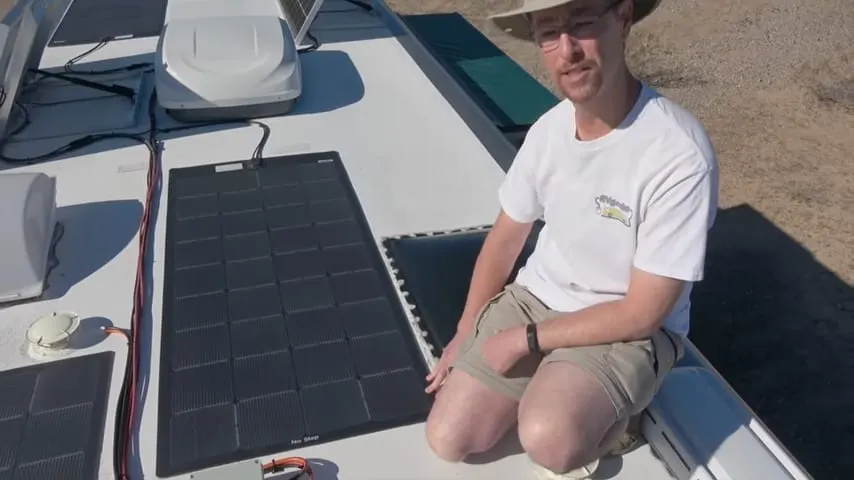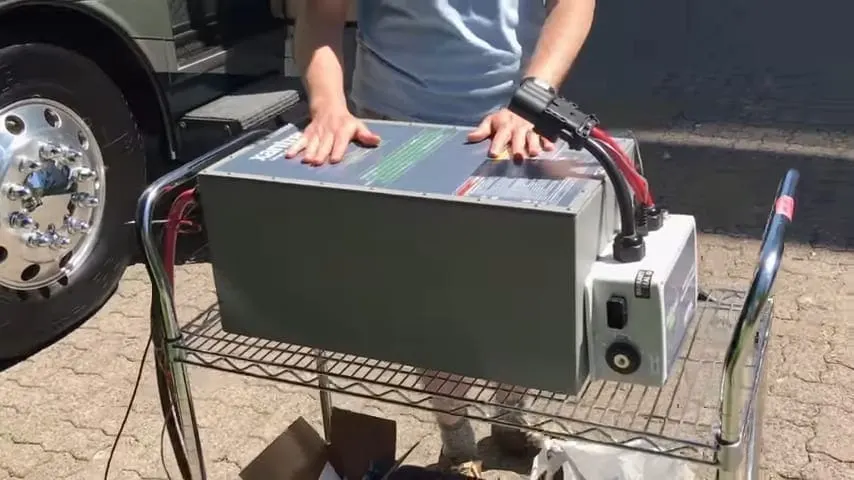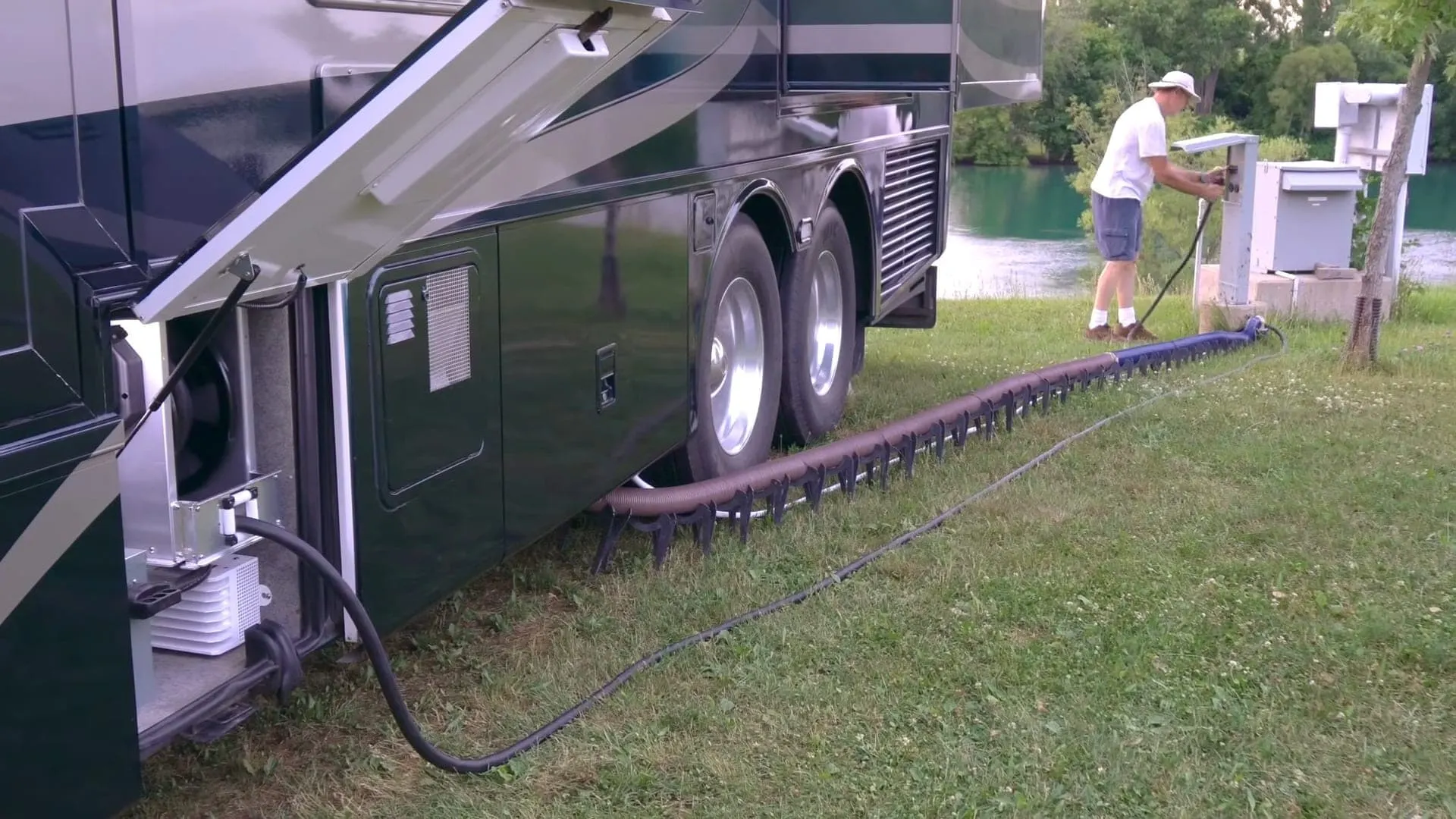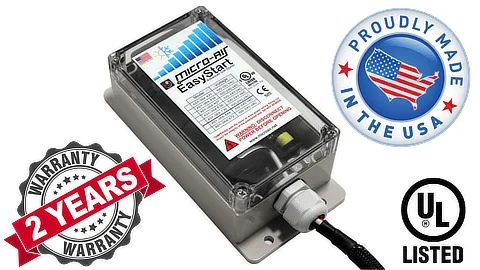Many RVers wonder about the possibility of using solar power for an RV air conditioner. After all, solar power is a tremendous benefit to RVers looking to sustainably power electronics, appliances, and devices by harnessing the awesome power of the sun.
We love our RV solar system. As longtime boondockers, we’ve enjoyed the benefits of solar power for years. Over time we’ve expanded the amount of solar power we’re able to generate by updating our solar array and our battery bank. But do we use that solar power for an air conditioner? Is it even possible?
In today’s post, we’ll take a look at the possibilities, the challenges, and the practicality of using solar power to run an RV air conditioner.
Can I Run My RV Air Conditioner on Solar Power?
Running an RV air conditioner requires a lot of electrical power. While it’s certainly possible to harness sufficient power to run an AC unit using solar energy, the setup required to do so would be extensive – and expensive. In fact, the expense alone could be a strong deterrent for most RVers. Here’s why:
An RV solar setup built to sustain off-grid living, including cooling the rig with an air conditioner, would be quite expensive just for the components required to create the setup, especially including lithium. And unless you can tackle the project yourself, you could easily add 50% to 100% more for professional installation.
So, cost alone suggests that running an RV air conditioner on solar power, while possible, may not be practical due to the size of the solar array, battery bank, and other components required to do so.
Components Needed for Solar Power for RV Air Conditioners
There are a handful of essential items required to generate solar power for an RV air conditioner. Let’s take a look at what you’d need.
Solar Panel Array
A solar array is the group of panels you’ve likely seen mounted to the roof of a house, garage, or RV. These panels convert sunlight into usable energy that’s stored in a battery bank. The more solar panels there are in an array, the more power can be generated in a shorter period.

We have a large array of rigid and flexible solar panels on our Class A RV along with a significant lithium battery bank.
Solar panels are dependent on sunlight to produce energy. Cloudy days, shade, and dirt (keep them clean!) will prevent solar panels from delivering to their fullest potential.
Battery Bank
Whether it involves a single lead-acid battery or multiple lithium batteries, a battery bank is a storage space for energy generated by the solar panels. The larger the battery bank, the more power available between charges.
There are pros and cons to the various types of batteries available on the market. Lead-acid batteries are the cheapest, but they’re heavier, require maintenance, and can be damaged more easily by allowing them to discharge too far.

Our Xantrex lithium-ion battery bank is substantial, but do we use it to run our RV’s air conditioning system?
Lithium batteries require no maintenance and can be discharged significantly below 50% without damage, with some brands safely allowing 100% discharge. They’re more costly upfront, but they’ll last many times longer than a typical lead-acid battery, though, so many RVers feel they’re worth the money in the long run.
Inverter
The type of energy that comes from a battery bank is DC, or “direct current”. However, an RV has power outlets that require AC, or “alternating current”, just like a sticks & bricks house, to power most household appliances.
Adding an inverter to a solar system takes the DC power from the battery bank (typically 12V, but sometimes 24V or even 48V) and converts it into AC power, allowing you to use electrical outlets and appliances that require 120 volts AC… including (possibly) your air conditioner.
Soft Start
Due to something called locked rotor amperage, air conditioners demand a large power spike upon startup. That spike can easily exceed the output capacity of your inverter. To prevent this, you’ll want to install a device called a soft start into your RV air conditioning units. A soft start allows the AC to be started without requiring that sudden surge of power or pulling as sudden a drain from the battery bank.
Run your A/C from a small, portable generator OR run two A/C units on a 30-amp connection. By reducing the start-up current needed to get your A/C compressor running, the EasyStart 364 keeps you...Show More
Run your A/C from a small, portable generator OR run two A/C units on a 30-amp connection. By reducing the start-up current needed to get your A/C compressor running, the EasyStart 364 keeps you cool!
Watch our EasyStart installation video
Get $25 off each Micro-Air EasyStart 364 you buy factory direct using the code listed here.
Show LessWhat Size Solar System You Need to Run an RV Air Conditioner
In order to use solar power for an RV air conditioner, especially for any length of time, you’d need a substantial battery bank, preferably lithium-ion. To feed that, you’d also need a large solar system. Sizing up your solar and battery banks just to accommodate the use of air conditioning would add significantly to the cost. It would also require considerable extra space, and add additional weight to your RV, which can be a big factor, especially on smaller rigs.
RVers who like to boondock need to size their solar & battery systems to meet basic off-grid needs like powering lights, TV, water pump, and other standard appliances and devices. If you decide to add air conditioning to that list of off-grid power usage, you’ll need to upsize the system substantially.
Unfortunately, there’s not an easy answer to just how much more solar and battery capacity you’ll need. A lot of that will depend on factors like how often you plan to run the air conditioning and for how long. And how sunny it is where you’re parked.
Is it Worth it to Use Solar Power for my RV Air Conditioner?
While it’s certainly possible to use solar power for an RV air conditioner, we don’t think that it’s really all that practical for the average RVer.

When you require air conditioning to be comfortable in your RV, using your generator or hooking up to shore power are the most practical ways to stay cool.
Unless you have a specific need to be able to do it, you’ll likely be better served by going to a full hook-up RV park or running your generator. The amount of money needed to size a solar & battery bank to be able to stay off the grid and run your air conditioner(s) will pay for a lot of fuel for your generator.
Then there’s the option that, for us and many other RVers, makes more sense: travel with the weather to areas that don’t typically require extensive AC usage… and visit campgrounds & RV parks with full hookups whenever AC is needed for comfort.
Why It’s Not Very Practical to Run an RV Air Conditioner on Solar Power
As we’ve established, running an AC unit on solar power would require substantial upsizing of both the solar array and battery bank. Most RVs don’t have sufficient roof space to accommodate the number of solar panels that would be needed to keep batteries charged while using RV air conditioning for more than a few hours a day. Without that, the batteries would start further and further behind each day, until eventually the battery bank would be depleted, even with full sunlight available all day every day.
When boondocking, it’s less costly and more efficient to use a generator to power the air conditioner while also recharging the battery bank. And a generator can charge the batteries while not being dependent on sunny skies.
So, the answer to the question “Can I run my RV air conditioner on solar power?” is that while it’s possible to do, we think that it’s not practical, reasonable, or affordable for most RVers. Even if you build out a system that can do it, you’ll likely be limited to using it for fairly short periods so that you don’t end up draining your battery bank completely.
At that point, you’d need to run your generator (or hook up to shore power) to recharge the batteries, anyway. So if you’re going to have to do that, why not just run your air conditioner off shore or generator power in the first place, and save the added cost of oversizing your other systems?
Geek Out with Us Every Week
Join our newsletter to learn about all things RV-related. Every week we offer free tips, tricks, product reviews, and more to our online community of RVers. Whether this is your first time on the road or you’re a seasoned expert, we’d love for you to geek out with us!



Jon
Sunday 10th of March 2024
Some of the portable solar generators (charged by solar, AC or 12 V plug while driving) have an RV plug and enough power to run an RV. Would this run an AC with the Easy Start? In some van builds, I've seen a mini-split RV or even a regular window AC used.
TheRVgeeks
Monday 11th of March 2024
Short answer: yes. An Easy Start will help ensure that the surge power needed to start the air conditioner up doesn't exceed the surge capacity of the inverter that's built into the solar generator. So it will help. The issue will be (1) having a solar generator large enough that it can handle that amount of power and (2) having one large enough (or several paralleled together) to be able to run the A/C for very long (you're looking at 1,500+ watts of power to run an A/C unit, which is going to suck the juice out of any battery bank very quickly)!
Maurice Weaver
Sunday 2nd of May 2021
Do any companies make a 12 volt clotes washing machine, say a 5kg capacity
TheRVgeeks
Sunday 2nd of May 2021
Great question, Maurice. Unfortunately, we've never heard of a 12-volt washing machine.